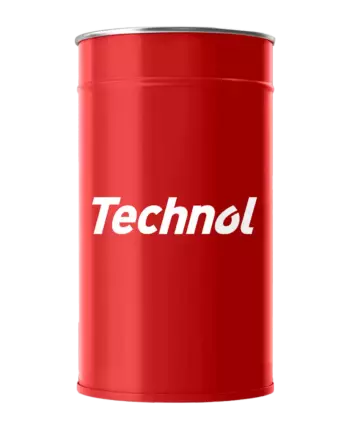Compressor Oil
What is Compressor Oil?
Compressor oil is a special technical fluid used in air and gas compressors. Its main functions are lubricating mechanical parts, cooling heat, reducing friction, and ensuring the long service life of the system.
These oils help maintain compressor efficiency, reduce internal corrosion, and prevent system contamination.
Types of Compressor Oils
Compressor oils play a vital role in ensuring efficient compressor performance, reducing mechanical friction, and optimizing heat dissipation. Choosing the right oil depending on the compressor type, operating conditions, and industry directly affects equipment longevity and performance. Main types include:
-
Mineral-Based Compressor Oils
Obtained through crude oil distillation and manufactured using traditional technology. They are ideal for:-
Simple and medium-duty systems
-
Equipment operating at low temperatures and pressures
-
Cost-effective applications
-
Environments with no strict cleanliness requirements
-
-
Synthetic Compressor Oils
Chemically engineered in laboratories and superior in performance compared to mineral oils. Advantages:-
High resistance to temperature and pressure
-
Better oxidation stability
-
Longer oil change intervals
-
Improved energy efficiency and reduced wear risk
-
Lower reactivity with air, providing stable operation
-
-
Polyalphaolefin (PAO) Based Oils
Belong to the synthetic oil category and are considered premium-quality products. Benefits:-
Excellent thermal and oxidative stability
-
Low volatility and evaporation rate
-
Extended oil change intervals
-
High performance even at low temperatures
-
Lower environmental contamination risk
-
-
Esters and PAG-Based Oils
Designed for special industries and extreme conditions:-
Corrosive chemical environments
-
Systems working with reactive gases
-
Compressors requiring high purity and stability
-
Water-miscible PAG oils are highly effective in moisture-prone systems
-
Biodegradable options available
-
Where and Why is Compressor Oil Used?
Compressor oils are applied across various industries for the following types of compressors:
-
Screw compressors
-
Piston compressors
-
Centrifugal compressors
-
Scroll compressors
Main purposes:
-
Reduce friction
-
Cool the system
-
Keep internal parts clean
-
Minimize corrosion and wear
-
Optimize energy consumption
Usage Guidelines and Recommendations
-
Select the oil according to compressor type.
-
Follow manufacturer instructions for timely oil changes.
-
Ensure the system is completely cooled before refilling.
-
Avoid mixing with previous oil without compatibility checks.
-
Regularly monitor oil level and cleanliness.
Storage Conditions
-
Store in a dry, dust-free, and cool environment.
-
Protect from direct sunlight.
-
Keep sealed and away from moisture.
Compressor oils are crucial for efficient equipment operation, extended service life, and prevention of technical failures. Properly selected and timely replaced oil ensures your compressors run smoothly for many years.
Showing all 9 results
What is Compressor Oil?
Compressor oil is a special technical fluid used in air and gas compressors. Its main functions are lubricating mechanical parts, cooling heat, reducing friction, and ensuring the long service life of the system.
These oils help maintain compressor efficiency, reduce internal corrosion, and prevent system contamination.
Types of Compressor Oils
Compressor oils play a vital role in ensuring efficient compressor performance, reducing mechanical friction, and optimizing heat dissipation. Choosing the right oil depending on the compressor type, operating conditions, and industry directly affects equipment longevity and performance. Main types include:
-
Mineral-Based Compressor Oils
Obtained through crude oil distillation and manufactured using traditional technology. They are ideal for:-
Simple and medium-duty systems
-
Equipment operating at low temperatures and pressures
-
Cost-effective applications
-
Environments with no strict cleanliness requirements
-
-
Synthetic Compressor Oils
Chemically engineered in laboratories and superior in performance compared to mineral oils. Advantages:-
High resistance to temperature and pressure
-
Better oxidation stability
-
Longer oil change intervals
-
Improved energy efficiency and reduced wear risk
-
Lower reactivity with air, providing stable operation
-
-
Polyalphaolefin (PAO) Based Oils
Belong to the synthetic oil category and are considered premium-quality products. Benefits:-
Excellent thermal and oxidative stability
-
Low volatility and evaporation rate
-
Extended oil change intervals
-
High performance even at low temperatures
-
Lower environmental contamination risk
-
-
Esters and PAG-Based Oils
Designed for special industries and extreme conditions:-
Corrosive chemical environments
-
Systems working with reactive gases
-
Compressors requiring high purity and stability
-
Water-miscible PAG oils are highly effective in moisture-prone systems
-
Biodegradable options available
-
Where and Why is Compressor Oil Used?
Compressor oils are applied across various industries for the following types of compressors:
-
Screw compressors
-
Piston compressors
-
Centrifugal compressors
-
Scroll compressors
Main purposes:
-
Reduce friction
-
Cool the system
-
Keep internal parts clean
-
Minimize corrosion and wear
-
Optimize energy consumption
Usage Guidelines and Recommendations
-
Select the oil according to compressor type.
-
Follow manufacturer instructions for timely oil changes.
-
Ensure the system is completely cooled before refilling.
-
Avoid mixing with previous oil without compatibility checks.
-
Regularly monitor oil level and cleanliness.
Storage Conditions
-
Store in a dry, dust-free, and cool environment.
-
Protect from direct sunlight.
-
Keep sealed and away from moisture.
Compressor oils are crucial for efficient equipment operation, extended service life, and prevention of technical failures. Properly selected and timely replaced oil ensures your compressors run smoothly for many years.
What is industrial oil?
Industrial oils are special fluids used in various industrial sectors that ensure the proper operation of machines and equipment, reduce friction, protect against corrosion, and balance heat. These oils are essential for both heavy industry and production equipment.
Why is industrial oil important?
-
Ensures the longevity of equipment
-
Minimizes energy consumption by reducing friction
-
Prevents overheating and wear
-
Reduces technical problems and maintenance costs
-
Increases system stability and performance
What are the main types of industrial oils?
Industrial oils are classified based on their functions and areas of use as follows:
Hydraulic Oils
Application: Presses, CNC machines, forklifts, industrial robots
Function: Transmission of pressure and maintaining stability in hydraulic systems
Compressor Oils
Application: Air compressors, refrigeration systems
Function: Lubrication and cooling of compressors
Gear Oils
Application: Industrial gearboxes, mechanical transmissions
Function: Lubrication of gears, reduction of friction and heat
Product suggestion: Technol Gear Oil EP 90
Turbine Oils
Application: Power plants, steam and gas turbines
Function: Heat transfer and pressure balancing
Heat Transfer Oils
Application: Heating systems, process ovens
Function: Heat transfer at high temperatures
Product suggestion: Technol AZURIT 32
Usage Guidelines for Industrial Oils
-
Correct type selection: Use the type specified in the technical documentation of the equipment
-
Clean systems only: Clean the system of contaminants before adding oil
-
Proper dosage: Excessive oil can lead to operational issues
-
Timely replacement: Expired oils can damage the system
Storage Conditions
-
Store in a dry and cool place (ideally between +5°C and +25°C)
-
Protect from direct sunlight
-
Containers must be tightly sealed
-
Keep away from moisture and dust
Industries suitable for industrial oil use:
-
Construction machinery (excavators, bulldozers)
-
Factory and plant equipment
-
Automatic transmissions and robots
-
Heating and power stations
Boost performance with Technol industrial oils!
Technol industrial oils are produced in accordance with international standards. The products are ISO, DIN, and API certified and are suitable for both heavy and light industrial equipment.



